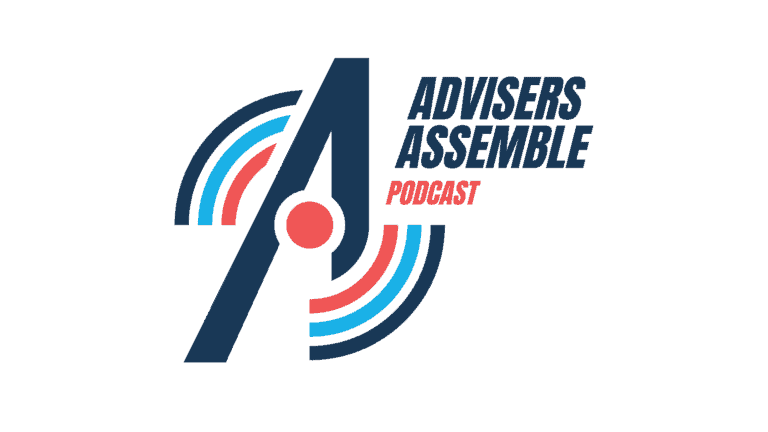
“So you want to be found on Google?
They want financial advice, they search for financial advice, and they find you. That’s financial advisor SEO in a nutshell.
Before you dive into hiring someone to do this for you I want you to find out what you can do yourself (quickly and easily) and get a base level of understanding first.”
Alex Curtis – Founder Of The Lead Engine – 18 Years Experience of Financial Advisor SEO
Quick, Free And You Don’t Need An SEO Expert!
The great thing about Google is it sees financial advice as a local service so you can compete with local firms, not all of them.“But I don’t want local clients!”
Don’t worry, we’ll get to that, you might just be missing a trick if you completely ignore local. Let me explain. When someone searches for: “financial advisor” They’ll see the ads at the top (PPC – pay-per-click – How Google makes its money) then it shows Google Maps and 3 local firms (sometimes 4 but the 4th is a pay-per-click ad).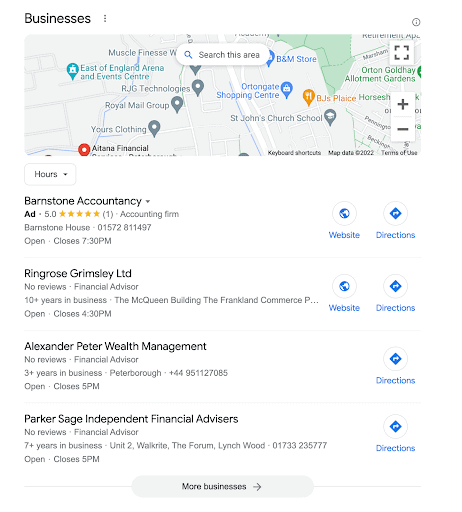
To be featured in the top three you don’t need an SEO expert, changes to your website, more content or anything complicated.
You just need more Google Reviews.
Mortgage brokers have cottoned on to this but it doesn’t seem as prominent in wealth management, pensions and investments etc. (search: “mortgage broker near me” you’ll likely see loads more reviews than if you search: “financial advisor near me”).
There are several things you can do to ‘optimise’ your profile but essentially whoever has the best reviews profile (highest number and all 5 stars) gets the majority of the business.
People find it very comforting to read genuine positive reviews about your service from a third party they trust (Google).
Depending on your location (population density), competition (is there clear daylight between your reviews and the nearest competitor) and your website (can of worms opened here) you can start getting enquiries pretty much straight away.
This may generate enough enquiries for you on it’s own, it’s a little tricky to predict.
We have tried to give you an idea of how to forecast your lead flow from being featured on Google Maps in this podcast episode called: Leads Forecast From Google Maps.
Need more than a handful of local enquiries?
If you’ve proved the concept works and your website is generating enquiries from Google Maps then you could either run PPC ads nationwide (or other specific locations) or use SEO to get in front of people searching for specific problems/solutions.
People don’t just search for an advisor they’ll search for information on their problem whether that be what to do with their pension (Full podcast episode available on pension leads), investments (More info on marketing strategies for wealth management), or inheritance tax planning.
Google currently doesn’t treat these as a local service. So good news you can be found by people nationwide, bad news is you’re competing with every other firm in the country.
This is the type of SEO where you might need an expert as it does get a little bit technical but bear with me.
We’ve identified three main things to rank on Google:
- High authority
- Great code
- Great content
People say SEO takes time…
It’s actually authority that takes time to build, if you’re an established business you may have built up quite a bit of authority already without knowing.
A brand new domain for a brand new business starts with no authority.
A firm that has been around for a few years might have built some authority without even knowing it.
How do I check my authority?
Currently, Google says it’s not a factor but every website we manage with a high DA (domain authority) ranks higher and faster than those without.
You can check your domain authority on quite a few websites like SEM rush or MOZ.
You’re probably best checking on websiteseochecker.com
It’s a score out of 100, but as a benchmark:
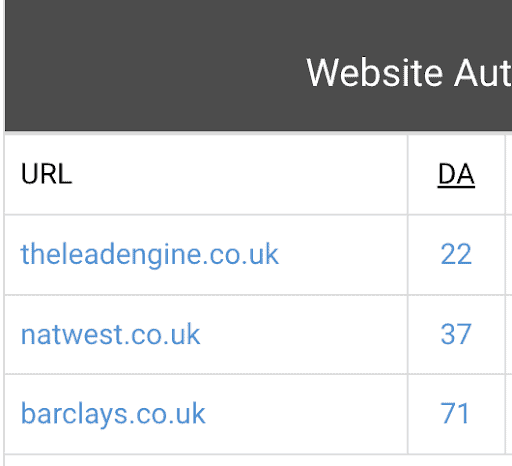
If DA is below 10 then I would focus on building that first because even with great code and content you might not see much impact in the first 12 months.
If your DA is between 10-20 you’re above average, if you work on your code and content you could reach some page 1 rankings in the first 12 months.
If your DA is 20+ you could start seeing results in 6 months or less.
How do I build authority?
Bearing in mind Google says they don’t look at this (what they say and what they do might be different!) we have to work backwards.
What do the high DA domains have that the others don’t?
- Age; If you’ve been around for a few years and had a live website, even if it’s rubbish you could be building authority.
- Reviews; (Google/Trustpilot) It makes sense that people with good customer feedback would have more authority.
- Branded search; People Google their name a lot. If lots of people seek them out each month then they must be trustworthy.
- Backlinks; They have great content that people link to, to reference (like I did earlier to the DA checker website)
- Content; Become a great resource of information.
Age
You can’t do much about this other than get your website live and indexed as soon as possible if you haven’t already done so.
Reviews
Hopefully, you’re already thinking about getting more Google Reviews to feature on Google Maps when someone searches for a financial advisor.
I really can’t stress enough how important third-party client feedback is compared to just adding some testimonials as text to your website.
If you can make it part of your client onboarding or client review process so that you’re asking for feedback from every happy client.
If you do mortgages too it’s a little bit easier, you can ask at the offer stage, they’re normally delighted at that point.
Hopefully, you’ve got an existing client bank that would be happy to review their experience.
Not sure which review platform to use for your business?
If you’ve asked for Google Reviews from your clients before you might find that the odd one or two might struggle.
If they have an android phone or a YouTube account then they’ll have a Google account already and it will be very straightforward.
If they don’t have a Google account then they might struggle (as you need one).
I would normally recommend to direct them to Google first and also use another platform like a Trustpilot (the free version is fine to start with) for those that can’t leave a Google Review.
For more detail on other review platforms including the industry ones like VouchedFor etc. check out our podcast episode: Reviews! Which platform and when to ask
Branded Search
This will happen naturally as people refer you, you’re probably getting more branded searches than you realise.
The first step would be to check that you are actually on top and you aren’t missing out on any opportunities (branded search normally converts to enquiry very well).
Most firms we work with were missing out on some easy enquiries before we managed this for them. You would expect them to enquire anyway, but they often don’t. Sounds unbelievable but we have quite a few case studies on this.
There might be another firm with a similar name or there might be someone running ads when someone searches for you.
Cheeky I know!
If this is happening it might not be as crafty as it sounds and there are some things you can do to combat this.
Check out our podcast episode, should I run Google ads on my brand name?
Do referrals search for my actual name?
Quite a bit of branded searches are down to referrals, it means your clients are mentioning your firm when they hear someone that needs advice.
If you’re a fairly established firm its probably happening more than you think.
But, just because you want to be known as something it doesn’t mean you are.
Your firm might be called: Joe Bloggs Wealth Management
Or Joe Bloggs Financial
But people might just search: Joe Bloggs
It’s a bit tricky to check yourself as you might not have SEO software at this point.
If you have Google search console set up (your web developer might have done this) you can see the actual searches you appear for and how many times you’re searched.
Or you could use the keyword planner in Google Ads to find out too.
If you do hire someone for SEO then it’s worth having that discussion with them.
Essentially you want to make sure Google can see the connection between the branded search and your website. For the authority and for the enquiries that come with it.
Are there any tactics to increase branded search?
This is where social media can come into your SEO plans.
We released a podcast episode called: Social Media is Sexy but SEO Pays The Bills
Having essentially said that social media can improve your awareness and branded search.
The more people that are aware of you will search for you when the time is right.
Backlinks
Back in the day it used to be the more the merrier. When Google first launched in 1998 it was easy to “trick the algorithm”.
“SEO Gurus” would create something called a private blog network (some still do it) and use their own sites to link to others.
Google is too smart for this, in fact, you may have heard our interview with David Thompson who wiped millions off the value of his life insurance business when Google did an algorithm update! You can listen to that one here.
Great Code
Google doesn’t read your website as humans do, it sends bots to read the code.
They want clean, efficient code that loads quickly.
You can check how quickly your site loads using Google’s page speed insights.
It will diagnose some areas that you could ask your web developer to fix for example:
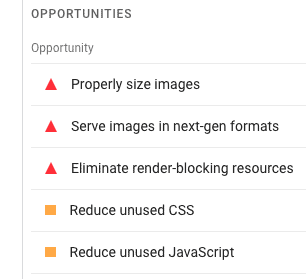
We build all of our client’s website’s from the ground up as part of our SEO strategy. However, content and authority do seem to have more of an impact on their Google rankings.
We invest quite heavily in super-fast servers and follow a strict process for each website to ensure they load quickly.
Just please don’t assume optimising the code will fix all your problems and shoot you up the rankings. You need authority and great content too.
Any tips when adding content?
Your web developer may have handed over your website with great code but when someone is adding new content some issues can arise.
The biggest one is copying and pasting your content from a word document (or Google Doc) straight into a website content editor.
If you do this it will paste a load of code that your website doesn’t need.
Most website content management systems (CMS) like WordPress for example normally have a ‘visual’ and a ‘text’ editor.
If you paste into ‘visual’ it will look “right” but will add lots of code to make sure your fonts and text sizes match your word document, not your website fonts.
If you paste into ‘text’ it will strip out all the code but won’t ‘look right’, you’ll then need to go and identify which parts are headings etc.
It adds an annoying step but it will help make your website code more efficient.
Hey. So I’m currently editing my website, and I’ve got some content on a Google Doc, and I’m going to copy and paste it into my website. The problem is some people make a little mistake here where they copy across inefficient code. So it sounds really technical, but it’s not. It’s really simple.
And I want to help you from avoid doing that. Google reads the code of your website and it wants it to be as efficient as possible. So I’ll show you where people sort of go wrong quite a bit. So I’ve got the bit of text that I want to bring across here. So I’m going to do this kind of chunk of text, and you can see I’ve got two different headings in there.
I’m going to go back to my website, and this is where I want to paste it in. Okay, so I’ve got my text editor here. You’ll notice there’s a visual and a text box. I’m using Elementor Page Builder, but whether you’re using Normal, WordPress or pretty much any content editor, they’ll often have this visual and text option. If I paste into visual, it’s going to bring a load of weird code along.
If I go over to text, anything that says span and style and font weight, I don’t want in there. I don’t need that. I want to use the text formatting that I’ve set in my website. That’s the same across everything else. I don’t want to specify different font weights and things.
So basically, I’m just going to clean up this code by pulling out everything that’s inefficient here. What it does save you time with the app does actually bring the heading code across for you. But I’ve told my website that I want my heading tools to be of a certain font way. I don’t want to change that. So it is a little bit of a process of just tidying up some of your content.
It’s brought this little bold thing for me, that’s great, but I don’t want all of this random bits of code. So I’m literally just cleaning it up so that I don’t have it in there. I don’t need this return space there either. So I’m doing it very quickly because all of this code that I’m deleting, google would have had to read, which I don’t want it to. I want my website to be very streamlined, and it’s all there.
So I pulled all that code out, and now that content is now ready for my website, and it’s done in an efficient way without extra bits of code. So just be really careful if you’re copying content out of a Word document, if you’re doing it yourself that you don’t want to bring across inefficient code. So, yes, it makes the process a little bit longer. But if you’re doing this for SEO purposes, google wants really efficient code. So just make sure you do that extra step and just clean it out before you publish.
Great Content
Pages rank on Google not websites.
Google wants to display the best, most relevant content page on the internet that matches the user’s search.
If someone searches: “Annuity vs Drawdown” it’s unlikely that your homepage would rank on Google.
Your “Annuity vs Drawdown” page (if you have one) would stand a much higher chance of ranking than your homepage (if you have a high DA and clean code).
Google is Q&A, they ask, and you answer.
It’s not like social media, you don’t need to entertain anyone with your SEO content.
You need to educate and be helpful. Infact there was a Google Algorithm update in 2022 called the “Helpful Content Update”.
We did a podcast episode upon a listener’s request for it, you can listen here
How much do I need to write?
The more the merrier unless you’re waffling, you need to provide detail whilst still getting to the point.
The lower your DA the harder you need to work, the higher your DA the more you can get away with.
High DA, Great Content, Clean Code, get all three and you dominate.
SEO software crawls the pages that are currently ranking for the search that you want to rank for. It will check the DA of the site’s ranking and the word count to give you a word count target to aim for.
You can obviously do this yourself.
Sometimes it’s really obvious that you’ll never rank for certain searches and visa versa (based on who is ranking, like a government website or a big brand).
SEO software just makes this a really quick process.
Fortunately when it comes to financial advice people search a wide variety of things (ask lots of questions).
What Should I Write?
Us SEO geeks call it “Keyword research”.
Essentially you want to find the questions that people ask on Google (FGQ – frequently Googled questions).
How to get content ideas without SEO software
Start with the type of client you want to work with, maybe you love giving pension transfer advice?
If you Google: ‘pension transfer’ or ‘impact investing’
Google will also show you what people also ask
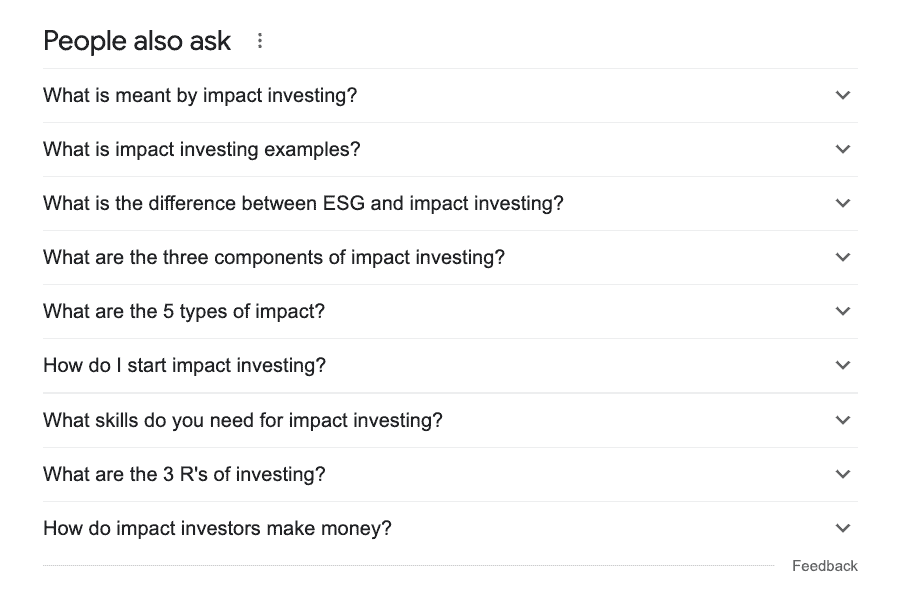
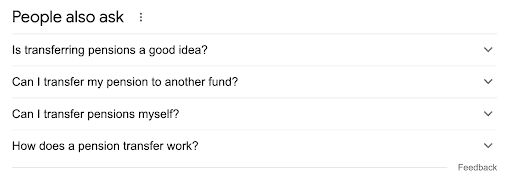
Keep rinsing and repeating this process and you’ll get lots of questions that you’ll be able to answer.
How do I know if a question needs its own page?
We like to create content hubs.
If you think of a hub like a category in an online store that you can filter down through.
You can find “Red Nike Running Trainers” within the “Trainers” category, “Running Trainers” category (which is a sub-category of the ‘trainers’ category), and the “Nike Running Trainers” category.
It’s like a hierarchy of categories.
You’ll want to do this with your pages, for example:
If your main topic is “Pensions” you’ll ideally need a page for this, even if it’s impossible to rank for.
If there are any searches within that topic that you think you could write 1000 words on, without it being too similar to your main “Pensions” page (or any page underneath Pensions, like DB Pensions).
The URLs might look like this:
yourwebsite.co.uk/pensions
yourwebsite.co.uk/pensions/defined-benefit-pensions
yourwebsite.co.uk/pensions/defined-contributions-pensions
Anything else I can do with my content?
There are a couple of things that we’ve found to help with both ranking on Google and also contributing to increasing enquiries.
- Internal linking
- Media
Adding Internal links
Once you start building up your content and adding it regularly you may want to reference other pages.
Your reader will find this helpful and therefore Google wants to see it too.
The more your content hub builds there more internal linking opportunities you’ll have. I wouldn’t try to force this, they should come naturally. So don’t try to think about “How many internal links should each page have”.
This might be an exercise that you’ll want to review, as and when you add more content.
Adding media
Even if this didn’t help your SEO I would still create content in an audio and/or video format. People buy from people and video/audio allows people to get to know your advisors.
From an SEO perspective if you embed a video or podcast then you may keep users on the page for longer.
Google can see how long people spend reading your content (through Google Analytics).
If people aren’t spending time reading your content then Google may assume that the content isn’t that great or doesn’t answer the query.
On the flip side, if they do spend a lot of time reading your content then your page is answering the query.
Google wants a good experience for their users, so they want people to get their queries answered.
Logic dictates that they’ll rank pages which people spend time reading, and pages that get lots of bounces (people going to a page then straight off) drop in rankings.
Best to use Videos?
Well, people are more forgiving with audio-only podcasts (they’ll listen for longer). When it comes to video you are demanding the user’s full attention. Whereas with an audio-only podcast they can still scroll your page while they listen.
Audio-only podcasts are easier to record and produce so you’ll get more content created.
You and/or your guests will not be worried about how they look (it’s nerve-wracking enough already right?). They can concentrate on adding value and sharing their expertise (just like how they do with clients on the phone).
At The Lead Engine podcast episodes are a core part of our SEO strategy for financial advisors, we explain all on The Advisers Assemble podcast episode: How we’re using podcasts for our clients in financial services.
If you’re thinking of launching your own podcast then check out our 5 part series called “How To Start Your Own Podcast”
We cover off:
- Planning your podcast
- Podcast formats
- Recording equipment
- Podcast editing
- Podcast promotion
Rather than launching your own podcast you could pitch to be a guest on someone else’s podcast.
You’ll be able to get an embedded podcast player for your website (the host would be more than happy to share as they’ll get more listeners).
We’ve put together this handy set of tips for being a guest on someone’s podcast
Top Video Mistakes
Video is a great tool to build rapport and engage with website visitors, it’s just people have short attention spans and want information quickly.
If you’re demanding their full attention they’ll want the answers quickly.
Here are a few common things that may stop people from watching the whole video (I’ve learned from my own mistakes and have done all of the below at some point before).
- Logo screen or corporate intro
- Not getting to the point immediately
- Trying to cram too much information in one video
Logo Screen or corporate intro
I’m sorry but nobody cares who you are until you demonstrate value, so I would move your logo until the end, if at all. It’s rare that someone would watch this video without seeing your logo anyway.
They’ll either watch on your website, your YouTube channel or one of your other social media accounts.
If you’re worried about that then have a logo in the corner and get straight on with the video.
Not getting to the point immediately
You don’t need to apologise or explain why you are creating a video. Sorry but nobody cares, they just want the information, normally an answer to their query.
If you’ve done your keyword research and know what your frequently Googled questions then start the video with the Question, then dive into the answer.
They might then start caring about you and your business once you’ve helped them.
Trying to cram too much information in one video
I try to follow the premise that each video is: one video, for one person, with one problem for one minute.
Reels and TikToks are huge at the moment. Because they are short, sharp and get to the point.
If you have a long video covering lots of points then you could allow people the option of the whole video or embedding relevant clips throughout your page.
Financial Advisor SEO
To rank on Google you need high authority, clean code and great content. You can do this yourself (I’ve taught plenty of advisors who now rank on page 1) or you can hire someone to do this for you (We’ve got lots of clients on page 1).
You may only need to be featured on Google Maps, with more reviews to get the extra enquiries you’re looking for.
Or you may look at PPC too if things are going to take longer than expected to generate the results you need.


